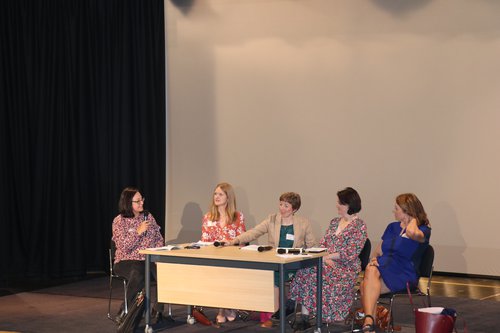Navigating Motherhood: event summary
 Transitions was one of the themes of the day and I ran a session exploring this in relation to motherhood. Our group was a splendid mix of life stages; mothers, grandmothers and women contemplating motherhood.
Transitions was one of the themes of the day and I ran a session exploring this in relation to motherhood. Our group was a splendid mix of life stages; mothers, grandmothers and women contemplating motherhood.
We discussed the challenges of becoming and being a mother. How does motherhood shape your work, financial security, relationships and sense of self? The group's advice to women considering motherhood was don't overthink it - it is hard to imagine being a mother before you do it but barriers can be overcome. Our group made the observation that motherhood is difficult to envisage because we do not know the child or children we are going to have. I would add to this that the journey to motherhood can be circuitous, unpredictable and painful.
“ How does motherhood shape your work, financial security, relationships and sense of self? ”
When we all came together in the plenary session, I was struck by how much the main themes in our motherhood discussions echoed those from other sessions. Make the most of your support networks. Don't be a perfectionist. Don't set yourself impossible expectations - good enough is fine. The concept of the good enough mother articulated by the psychoanalyst and paediatrician Donald Winnicott continues to resonate; trying to be a perfect mother is not good for children or for women either. He contended that it is through mothers' mishaps that babies come to learn love.
 However simply being 'good enough' goes against the grain of current cultural expectations of mothers. In 1998, the American sociologist Sharon hays coined the term 'intensive mothering' which she defines as "child-centred, expert-guided, emotionally absorbing, labour-intensive and financially expensive." Hays' work has stimulated a rich body of research and a powerful critique of how the ideology of intensive mothering is used to reinforce existing gender relations and inequalities. In their research among Black low-income single mothers, Sinikka Elliott, Rachel Powell and Joslyn Brenton conclude that intensive mothering:
However simply being 'good enough' goes against the grain of current cultural expectations of mothers. In 1998, the American sociologist Sharon hays coined the term 'intensive mothering' which she defines as "child-centred, expert-guided, emotionally absorbing, labour-intensive and financially expensive." Hays' work has stimulated a rich body of research and a powerful critique of how the ideology of intensive mothering is used to reinforce existing gender relations and inequalities. In their research among Black low-income single mothers, Sinikka Elliott, Rachel Powell and Joslyn Brenton conclude that intensive mothering:
"increase their burdens, stresses, and hardships even while providing a convenient explanation for these very difficulties: mothers are to blame. This convenient fiction in turn supports and justifies the huge disparities in life opportunities among American families today as social safety nets continue to erode."
We need to understand motherhood in political terms. Firstly, how ideologies of mother hood are deployed and why. There is nothing natural or inevitable about how women mother their children and patterns of care have varied enormously over history. Intensive mothering is a distinctive product of our times rather than a reflection of universal truths about child rearing. In her book 'Mother: An Unconventional History' Sarah Knott argues eloquently for knowing the past:
"Historical forgetting leaves holes in the fabric that binds us. Things that seem natural only by force of repetition too easily take on a false status. Appeals to old, mistaken certainties, or to universals, stand uncorrected."
Secondly, we need to move the spotlight away from what mothers are or aren't doing and instead focus on what resources women (and men) need as parents. Factors such as poverty, housing, health, partner violence and childcare have a profound influence on children's lives and futures.
Moving from the political to the personal, on an individual level mothers need assurance and support. I have seen in my postnatal work that women tend to focus on their perceived shortfalls rather than the many ways they are caring for their babies. Everything that women do for their children should be valued. This was one of the key takeaways from our session - mothers need affirmations, even changing a nappy is an important pursuit!
I came away from out session on motherhood feeling a sense of gratitude to the group for their candour and thoughtful observations. We should talk about motherhood more, both personally and politically.
Check for updates on the Women's Network Facebook Page